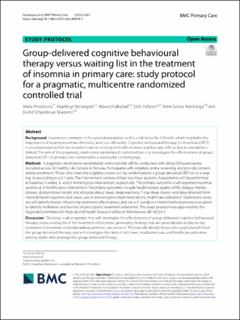| dc.description.abstract | Background
Insomnia is common in the general population and is a risk factor for ill-health, which highlights the importance of treating insomnia effectively and cost-efficiently. Cognitive-behavioural therapy for insomnia (CBT-I) is recommended as first-line treatment due to its long-term effectiveness and few side-effects, but its availability is limited. The aim of this pragmatic, multicentre randomized controlled trial is to investigate the effectiveness of group-delivered CBT-I in primary care compared to a waiting-list control group.
Methods
A pragmatic multicentre randomized controlled trial will be conducted with about 300 participants recruited across 26 Healthy Life Centres in Norway. Participants will complete online screening and provide consent before enrolment. Those who meet the eligibility criteria will be randomized to a group-delivered CBT-I or to a waiting list according to a 2:1 ratio. The intervention consists of four two-hour sessions. Assessments will be performed at baseline, 4 weeks, 3- and 6 months post-intervention, respectively. The primary outcome is self-reported insomnia severity at 3 months post-intervention. Secondary outcomes include health-related quality of life, fatigue, mental distress, dysfunctional beliefs and attitudes about sleep, sleep reactivity, 7-day sleep diaries, and data obtained from national health registries (sick leave, use of relevant prescribed medications, healthcare utilization). Exploratory analyses will identify factors influencing treatment effectiveness, and we will conduct a mixed-method process evaluation to identify facilitators and barriers of participants’ treatment adherence. The study protocol was approved by the Regional Committee for Medical and Health Research ethics in Mid-Norway (ID 465241).
Discussion
This large-scale pragmatic trial will investigate the effectiveness of group-delivered cognitive behavioural therapy versus waiting list in the treatment of insomnia, generating findings that are generalizable to day-to-day treatment of insomnia in interdisciplinary primary care services. The trial will identify those who would benefit from the group-delivered therapy, and will investigate the rates of sick leave, medication use, and healthcare utilization among adults who undergo the group-delivered therapy.
Trial registration
The trial was retrospectively registered in the ISRCTN registry (ISRCTN16185698). | en_US |

